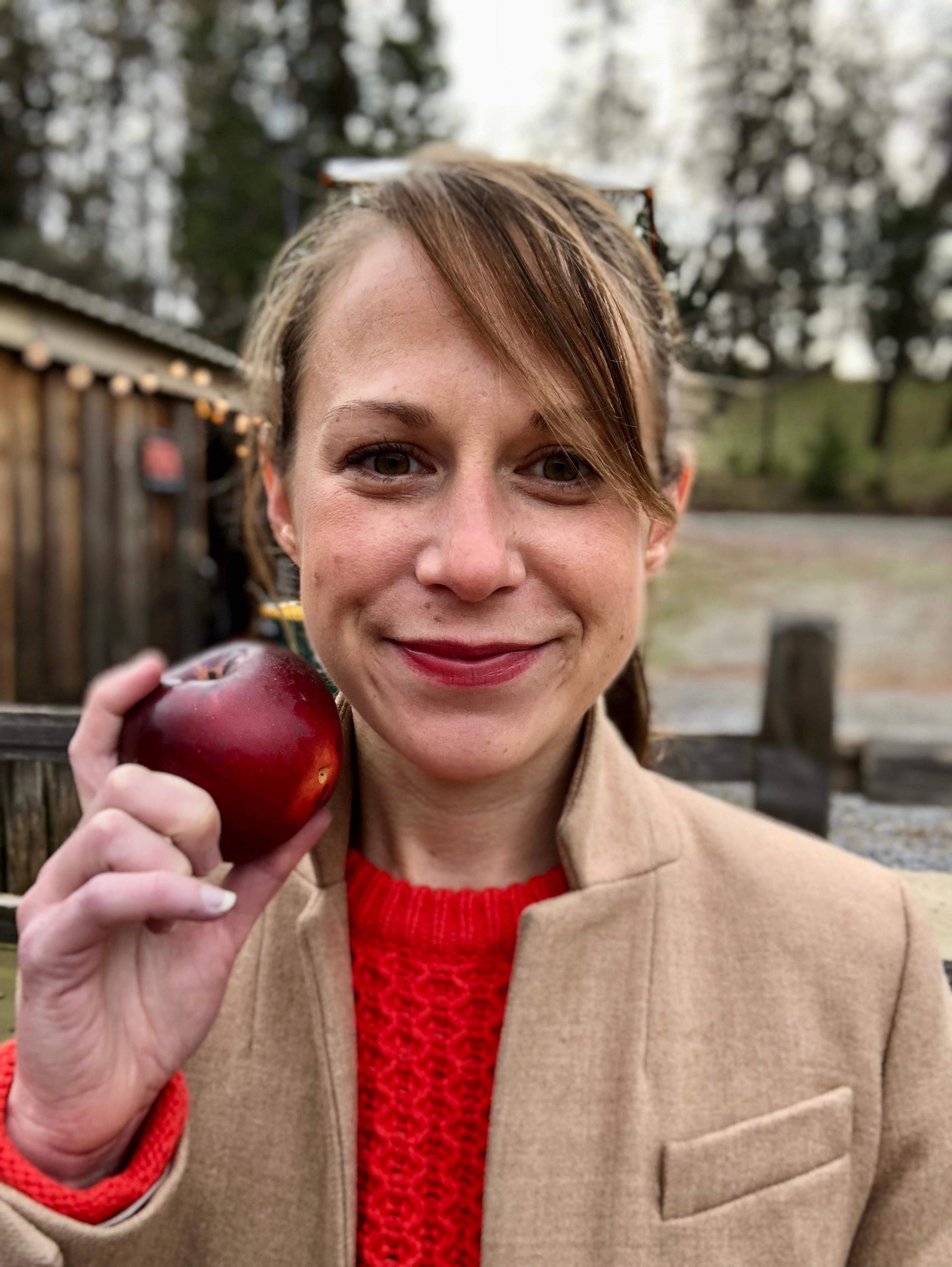
I saw an Instagram Reel the other day that stopped me in my tracks. The video showed a pair of hands making a beautiful coffee drink, complete with cream, sugar, and chocolate, as text across the clip declared: “You cannot be the baddest b*tch if you are f*cking hungry. Eat something.” This statement, so bold and so simple, struck me to the core.
As someone in recovery from anorexia, I’ve spent years—maybe decades—of my life being hungry. I floated through adolescence, college, and parts of my twenties as a ghost of myself, living a hazy half-life simply because I wasn’t eating enough. Of course, I had moments of joy and laughter, I accomplished things, I formed lifelong relationships; but, if I’m being completely honest, I was often only partly there. The rest of me was thinking about my body, or exercise, or, most often, food. I was hungry.
I remember vividly one night in my senior year of college, when my boyfriend’s older brother came to visit. I loved his brother—he was a writer, I was a writer, we got along swimmingly—and my boyfriend had planned a fun evening for us to chat about post-college plans over nice beer. It would be fun, maybe even fruitful for my career. But, of course, my eating disorder thought differently: not only did this plan include beer with an unknown amount of calories and perhaps snacks I’d need to dodge, but it would also disrupt the ritualistic exercise and eating routines I had planned for the evening. When my boyfriend came to my dorm room, I lay still on my bed, letting him knock and knock at the locked door. When he eventually gave up, I peeked my head out and watched his crestfallen silhouette retreating down the hallway. Later, I texted to say I was sick, that I’d slept through his knocking.
Maris Degener, Equip’s Director of Peer Mentorship, recounts an anecdote with echoes of my own from when she was struggling with an eating disorder. She’d just been asked to prom by a boy she liked, but her initial excitement was almost immediately replaced by dread. “There was a gathering for pictures and pizza before heading to the dance—I couldn’t even fathom how my peers would be able to eat pizza and not think about it all night long,” she recalls. “There was more food at the dance itself—food my eating disorder, again, couldn’t imagine eating without guilt or shame. And staying out late was of course a problem, since it would interrupt the rituals I had around exercise.” She spent the night hungry and irritable and had her mom pick her up early, just two hours into the night.
“The eating disorder took what could have been a fun and exciting memory of teenagehood and made it one that I now look back on with a lot of sadness,” she says. “I wish I could have danced without caring about what time it was, and I wish I could have eaten the pizza and the cookies, and I wish I could have been kinder to someone who had invited me to share a memory with them.”
Anyone who has struggled with an eating disorder has memories like this, examples of opportunities missed, of occasions both special and mundane ruined by their disease. For me, at least, I didn’t even realize how small my life was until I began to recover, to reclaim the space in my mind where the anorexia had been squatting for so long.
This hijacking of one’s brain is characteristic of eating disorders. While many people associate eating disorders with certain observable behaviors, the cognitive and mental component can be even more oppressive. Indeed, people with eating disorders are almost universally preoccupied with thoughts about food, eating, body, and weight, and these thoughts limit their ability to truly think about anything else—their friends, a book, their life goals—let alone be present and participate fully in life.
“Building a life worth living is what ultimately freed me from my eating disorder,” says Kristina Saffran, Equip’s co-founder and CEO. “Participating in treatment from home enabled me to make new friends in high school and act in the school play. When my family slowly started to hand back control of food, it was tempting to relapse, but I’d already built up enough good things in my life that I knew there were real consequences to relapsing. Recovery gave me back significant brain space to invest in people, ideas, hopes, and dreams far beyond the narrow confines of food and body.”
That’s why, at Equip, we talk about “building a life worth living” through recovery. When the eating disorder goes away, the whole world opens, and you can reconnect with the things you love, the things that are meaningful to you, rather than scrambling every day to keep the eating disorder happy. You tear down the protective, confining walls of the eating disorder and allow in the full range of emotions—from exuberant joy to despair—that make us human and give life meaning.
I look at my life today and see countless experiences that bring me great joy that simply wouldn’t be possible if the anorexia were still in control: cuddling in bed with my family on the weekends (the eating disorder would yell at me to get up and exercise); actually eating one of the cookies I bake with my daughter (the eating disorder would tell me to make hair-brained excuses and promise I’d eat one later); scouring my beloved collection of cookbooks to plan out a week’s worth of meals (the eating disorder would lead me to a sad online search for the lowest-calorie recipes I could pass off as normal meals).
Today, that’s what a life worth living looks like for me. Here’s what it looks like for some other people on the Equip team:
“Being able to enjoy food and eat what sounds good for you in the moment without having to think about it all the time. This in itself will allow you to be more present in the moment and in your life.” - Gaby Cohen, Registered Dietitian
“A life that allows for a range of experiences; happy, sad, anxious, elated, unsure. My eating disorder forced me into a life of tight controls because I was so afraid of experiencing the range. Now my life is filled with so much variation and the freedom to be uncomfortable without collapsing into an anxiety spiral.” - Equip employee
“Having food freedom so that you don't pass any of the ED food traits you used to partake in down to the children that you never thought were possible. Being able to focus more in the moment of life rather than thinking about how your body looks or what foods are going to be offered.” -Stephanie Kile, Registered Dietitian
“When I was in treatment, I had a goal to be able to take care of a dog even though I couldn’t take care of myself. Now I have a dog, I am able to take care of her, and she has helped me access my values during times when it was difficult. She constantly reminds me why life is worth living, and has even been able to teach me about trusting my body. For me, she is ‘a life worth living’ personified.” -Kelsey Gilchriest, Peer Mentor
“Being able to fully participate in all that life can offer you without holding back or having regret over missed opportunities. Feeling fully alive and filled with hope, purpose, and promise. Believing that you are worth it, and dearly loved.” - Equip employee
“My life worth living allows me to live alongside all of my emotions and thoughts without being consumed by them.” -Equip employee
“Building a life worth living means building a life where I don't need to use harmful coping mechanisms to make me feel okay. It means finding confidence and security in myself, and building my coping tools so that I can handle whatever my life throws at me. Recovery is so much more than stopping a behavior, it's also about fully connecting to the world, and turning my isolation into connection with others.” -Olly Millar, Clinical Operations Associate
“Building a life worth living for me means doing all of the things I was scared of doing while living with my eating disorder. It means spending time with family members, signing up for art classes, traveling, dating, cooking, trying new foods, exploring new clothing styles, making new friends, and moving on with my life. During my last treatment stay I really focused on ‘enjoying the little things in life’—that was my mantra. I started to enjoy and take notice of all of the small things in life that my eating disorder made me numb to or kept me from.” -Equip employee
“Building a life worth living means putting into action the things that will bring you closer to your goals, your dreams and your authentic self. Whether it's facing a fear food, finding new hobbies, taking time to rest, or taking a big leap like moving abroad, building a life worth living is reclaiming your life as your own, free from an eating disorder.” -Equip employee
“To me, building a life worth living really describes the pillars I have put in place to help hold up my recovery. When I was in my eating disorder, it felt like that was the one life raft keeping me afloat. Recovery for me was setting up pillars that kept me anchored into recovery rather than floating away. Pillars like pursuing schooling I feel passionate about, friends, family and chosen family, meaningful work, and leaning into all the hobbies and passions that I authentically and shamelessly love.” - Jamie Drago, Peer Mentor
“A life where I can invest in relationships, show up for myself, and show up for others. A life where I have a sense of purpose and am able to make meaning. A life where I'm able to be present with myself and others.” -Scout Silverstein, Senior Programming Lead
For patients who go through treatment at Equip, we see them start to build a life worth living in different ways. Often, it begins as a look of happiness on their face—families often say that “the lights went back on” when describing their loved one’s recovery—a revival of their sense of humor, an ability to participate in and enjoy the activities they used to love. It shows up in the joy of eating, of trying new and adventurous foods; it shows up as socializing with friends again, getting a part-time job, applying to college, becoming excited about the future.
A life worth living is different for everyone, but what matters is that it’s a life chosen by you and not by the eating disorder. For me, today, that meant happily accepting the syrupy bite of waffle my little girl forked toward my mouth while she ate her breakfast. Tomorrow, I’m not sure what it will mean—because, when an eating disorder stops ruling your life, the possibilities become infinite.
Citations:








